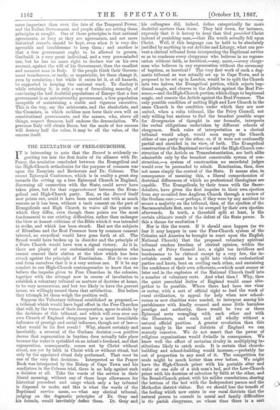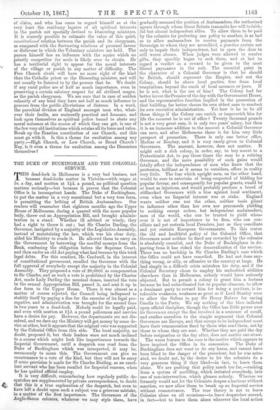THE EXULTATION OF FREE-CHURCHISM.
T is interesting to note that the Record is evidently re- gretting too late the first fruits of its alliance with Dr. Pusey, the armistice concluded between the Evangelical and . the High-Church orthodoxies for the purpose of common war upon the Essayists and Reviewers and Dr. Colenso. The recent Episcopal Conference, which is in reality a great step towards the setting up a free Episcopal Church in England, disowning all connection with the State, could never have taken place, but for that rapprochement between the Evan- gelical and High-Church party. Nor, as the Record itself now points out, could it have been carried out with as much success as it has been, without a tacit consent on the part of Evangelicals and High Church to waive all the points on which they differ, even though these points are the most fundamental to our existing difficulties, rather than endanger the blow at honest criticism of the Bible which it was intended to strike, and which has been struck. Had not the subjects of Ritualism and the Real Presence been by common consent tabooed, no encyclical would have gone forth at all. The Synod would have broken up in disorder and the principle of a State Church would have won a signal victory. As it is, there are plenty of our ecclesiastical contemporaries who cannot conceal their elation at the blow which has been struck against the principle of Erastianism._ Nor do we con- ceal from ourselves that it is a very serious one. If it be any comfort to our High-Church contemporaries to know that we believe the impulse given to Free Churches in the colonies, together with the attempt now in course of incubation to establish a voluntary tribunal on matters of doctrine at home, to be very momentous, and but too likely to have the gravest issues, we willingly accord them that satisfaction. But before they triumph let them weigh the position well.
Suppose the Voluntary tribunal established as proposed,— a tribunal which would have legal effect in the Free Churches that will, by the terms of their incorporation, agree to abide by the decisions of this tribunal, and which will even over our own Church of England clergymen have a most formidable influence of prestige and social influence, though not of law— what would be its first result ? Why, almost certainly and inevitably, a reversal of the Gorham decision ;—a positive decree that regeneration in baptism does actually take place because the water is sprinkled on an infant's forehead, and that regeneration, consequently, comes not by Christ without ritual, nor yet by faith in Christ with or without ritual, but only by the appointed ritual duly performed. That must be one of the very first decisions. Interpreted as the Prayer Book was interpreted by the Bishop of Cape Town and his coadjutors in the Colenso trial, there is no help against such a decision at all. Take the words of the service in their literal meaning, without any of those large allowances for historical precedent and usage which only a lay tribunal is disposed to make, and this is what the words of the Baptismal service mean, — what any clerical tribunal, judging on the dogmatic principles of Dr. Gray and his friends, would inevitably define them. Dr. Gray and his colleagues did, indeed, define categorically far more doubtful matters than these. They laid down, for instance, expressly that it is heresy to deny that God punished Christ instead of punishing man,—that His wrath actually fell upon Christ. Well, if this language can be held to be absolutely justified by anything in our Articles and Liturgy, what can pre- vent a clerical tribunal from interpreting the Baptismal service so as to condemn every clergyman who believes in no regene- ration without faith, as heretical,—nay, more,—every clergy- man who believes in any regeneration without the ceremony of baptism, as heretical ? The very first work of such a dog- matic tribunal as was actually set up in Cape Town, and is proposed to be set up in London, would be to split the Church into two halves, the Evangelical portion, which rejects bap- tismal magic, and cleaves to the Article against the Real Pre- sence,—and the High-Church portion, which clings to baptismal magic, and resents the Article against the Real Presence. The only possible condition of uniting High and Low Church in the same Church is the condition under which they are now united, when a calm tribunal, like the Privy Council, not only willing but anxious to find the broadest possible scope- for divergencies of tkought in our formulse, interprets- the verbal obligations undertaken by different schools of clergymen. Such rules of interpretation as a clerical tribunal would adopt, would soon empty the Church either of one party or the other, or, if it were not confessedly partial and onesided in its view, of both. The Evangelical construction of the Baptismal service and the High-Church con- struction of the Article on Transubstantiation, are both alike admissible only by the broadest conceivable system of con- struction,—a system of construction no sacerdotal judges would ever be persuaded to admit. Erastianism, then, does not mean simply the control of the State. It means also, in. consequence of meaning this, a liberal comprehension of doctrinal differences of which no professional theologians are capable. The Evangelicals, by their truce with the Sacer- dotalists, have given- the first impulse to their own ejection from any so-called free Anglican Church through a review of the Gorham case ;—or perhaps, if they were by any accident to- secure a majority on the tribunal, then, of the- ejection of the Sacramentalists first, sure to be avenged by their own ejection afterwards. In truth, a threefold• split at least, is the- certain ultimate result of the defeat of the State power. Is this a theme for exultation I Nor is this the worst. If it should once happen (as we fear it may happen in case the Free-Church system of the- Colonies and America be brought to react upon the English National Church) that the proposed voluntary spiritual tribunal renders freedom of clerical opinion, within the- bounds of Privy Council law, a right too invidious and burdensome to be claimed except by a very few, the in- evitable result must be a split into violent ecclesiastical parties and knots, bent on reviling each other, and sustaining the confidence of their own adherents,—which must sooner or later end in the explosion of the National Church itself into a number of voluntary sects. And what then ? Why, then the quiet parochial duties of England would cease alto- gether to be possible. Where there had been one vicar or rector, with a sort of official right to lead the work of rural civilization, to appeal for help when new school- rooms or new charities were needed, to interpose among his parishioners with kindly counsel and some little harmless prestige and authority, there would be two or three Episcopal sects wrangling with each other and with the Dissenters, and each and all wholly without a natural official position. A greater revolution than this imply in the rural districts of England we can scarcely conceive. We do not assert that the power of religious organizations would dwindle in consequence. NVe know well the effect of sectarian rivalry in multiplying in- stitutions likely to catch souls. It is certain that church- building and school-building would increase,—probably far out of proportion to any need of it. The competition for souls might be much hotter than ever before. We might have the High-Church priest with his portable altar and wafer at one side of a sick man's bed, and the Low-Church priest with his doctrine of salvation by faith at the other, and the Broad-Church priest, with his milder consolations, sharing the bottom of the bed with the Independent parson and the Methodist district visitor. But we should- lose the benefit of the feeling which now exists in our rural districts that the natural person to consult in moral and family difficulties is the parish clergyman, on whose time there is a sort
of claim, and who has come to regard himself as at the very least the residuary legatee of all spiritual interests in the parish not specially devised to Dissenting ministers. It is scarcely possible to estimate the value of this quiet, constitutional relation between the parish and its clergyman, as compared with the fluctuating relations of personal favour or disfavour in which the Voluntary ministers are held. The parson himself has an influence with the squire which no priestly competitor for souls is likely ever to obtain. He has a territorial right to appear for the moral interests of the village or parish in any matter of difficulty. The Free Church rivals will have no more right of the kind than the Catholic priest or the Dissenting minister, and will not usually be listened to by the powers that be. We doubt if any rural police are of half as much importance, even in preserving a certain salutary respect for all civilized usages, as the parish clergymen. We are sure that in case of sudden calamity of any kind they have not half as much influence to procure from the public alleviations of distress. In a word, the parochial division of England amongst men who, what- ever their faults, are eminently practical and humane, and look upon themselves as spiritual police bound to abate any moral nuisance at the source of which they can get, is one of the few very old institutions which retains all its force and value. Break up the Emden constitution of our Church, and this must go with it. Is this a theme for exultation among any party,—High Church, or Low Church, or Broad Church ? Nay, is it even a theme for exultation among the Dissenters themselves f































 Previous page
Previous page